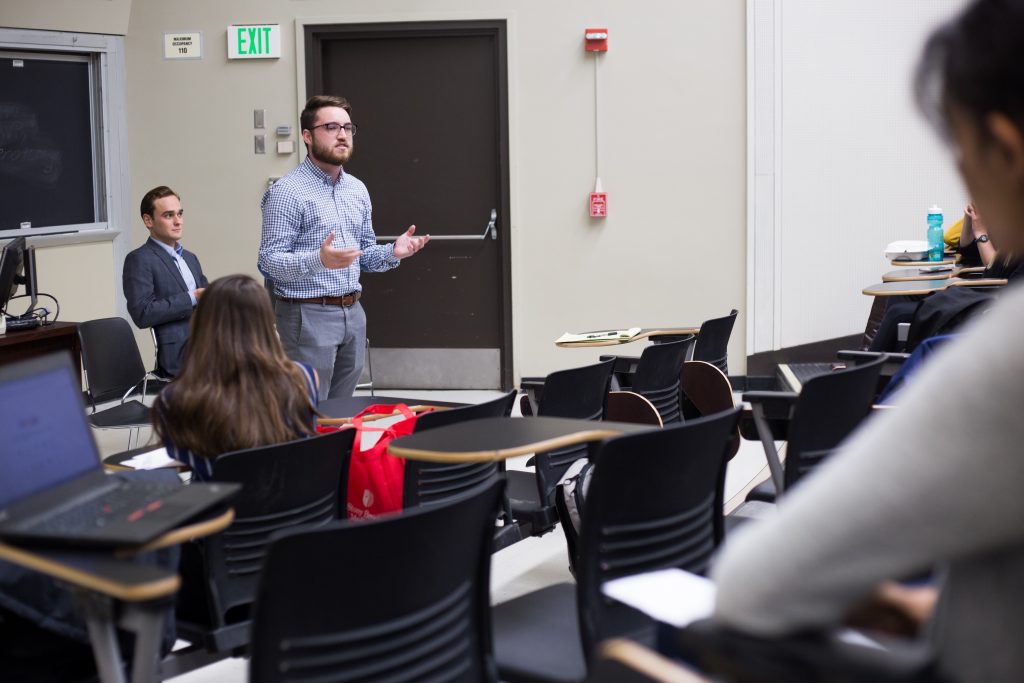Midterm elections are rapidly approaching, and with all eyes on New York’s 22nd congressional district, Binghamton University’s campus organizations are hoping to educate and engage student voters.
On Monday in Lecture Hall 10, The Roosevelt Institute, BU’s chapter of the New York Public Interest Group and the Center for Civic Engagement (CCE) collaborated to host “22 and You: A Midterm Election Information Session.” An audience of approximately 30 students acquired information about candidates in New York’s gubernatorial, senatorial and congressional races.
The event also touched on issues of civil engagement in young Americans. Jerry Toussaint, president of the Student Association and a senior majoring in philosophy, politics and law, discussed the historically low voter turnout in people aged 18 to 29. He stressed the competitiveness of races in Broome County and New York’s 22nd congressional district and told students that making their voices heard is important in the upcoming midterm elections.
“We have the power to change elections,” Toussaint said. “We have the power to shape our politics the way we want them to be — community, state and federal. Education is one of the first steps to being civically engaged, and what follows that is to do as much as you can for the communities which you live in. Although many of us may not originally reside in Binghamton, it is now our community, and it is up to us to shape our communities the way we want them to be.”
CCE members then took to the front to discuss New York’s gubernatorial candidates: incumbent Democrat Andrew Cuomo, Republican Marc Molinaro, Libertarian Larry Sharpe, Serve America Movement candidate Stephanie Miner and Green Party candidate Howie Hawkins. The members relayed information regarding each candidate’s stance on issues such as abortion, health care, education and gun control, allowing attendees to evaluate their options.
Later in the night, attendees Jacob Bezner, a team leader at Generation Vote and a junior double-majoring in political science and history, and Chris DeMarco, president of the College Republicans and a senior majoring in political science, went head-to-head advocating for their respective candidates.
Generation Vote is a nonprofit advocacy organization that aims to connect students to local politics. To this end, it specifically partners with candidates it believes value student voices. Bezner argued Brindisi has proven that he does respect student opinions, citing Brindisi’s visit to BU’s campus earlier this month.
“[Brindisi] was the first candidate in history to come to campus and be like, ‘You know what? Maybe we should actually listen to students for once,’” Bezner said. “Before that, students have systemically been kept out of local political discourse because candidates have decided to steer away from Binghamton University, even though it’s turned into what many call the jewel of the Southern Tier. You’d think candidates would try to engage with us, but time and time again, they fail to do so.”
DeMarco, however, said incumbent Republican Claudia Tenney puts emphasis on the economy, which he sees as one of the most important issues facing upstate New York and Broome County.
“Only Republican candidates are best prepared to keep the economy on its current course,” DeMarco said. “Tenney voted to lower corporate taxes, which allows American companies to remain fiercely competitive in the local economy, something that’s very important for all of our economic interests. The economy in general over the last few years in Republican control has been nothing short of stellar. Gross domestic product growth has been close to 4 percent over the past two years, which is unprecedented, and according to many economists, a seemingly impossible level of growth for a developed nation.”
Sarah Martin, a senior majoring in environmental studies, said she already knew who she was voting for, but she was glad to have the opportunity to learn more about candidates by attending.
“Everyone who spoke here tonight was very well-spoken, well-researched, very collected and willing to expand on the views of the candidates they represented,” Martin said. “I did come in with a notion that I would [vote for Brindisi], but I’m glad I came because I feel affirmed in my decision.”



